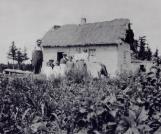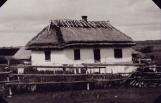1
Mary Somyk tells about her first years in Canada.2
Ukrainian pioneer family in front of their housec 1915
Malonton, Manitoba, Canada
 Credits:
Credits:Manitoba Archives, W. J. Sisler Collection
3
My parents, William and Mary Syrnyk, came from village Peremyliw, Husiatyn Region, Ternopil Province. They owned very little property. We were four sisters in the family and when we grew up there wasn't much to share among us. My parents were quite concerned about their children's future. It was poverty that compelled them to abandon their native land and sail across the ocean.The man from Transcona spoke the truth when he penned these kolomeyka lines:
It was penury that drove us
Overseas to seek our fortune.
And our days were filled with sorrow
As we crossed the wind-tossed ocean.
But we couldn't break the fetters
Holding us in wretched bondage.
My parents came to Canada in 1899 and settled in Ethelbert, Manitoba. My father's brothers, Philip and Hnat, were already there having come a year earlier. I was born a few months after my parents came to Ethelbert.
My mother and older sisters used to talk to me about all the hardships that they had lived through. As I grew older, I experienced similar hardships first hand.
The first thing that my parents had to do when they came to Canada was to build some sort of house on the homestead and prepare enough ground to plant some potatoes and other vegetables. They had no farming tools and had to work the land as best they could.
My parents were very worried about their economic situation because they already had five daughters to support. There was also my paternal grandmother to take care of.
The hard work and constant worry brought on my father's illness and after some time he died, leaving my mother widowed and the children orphaned.
My sisters told me that when my father was lying sick in bed he used to ask my mother for something to eat. But there was no proper food to give him, especially someone who was very sick. She would say to him: "What can I give you, William dear, when we have nothing in the house?"
I was only a year and a half old when he died following a long illness. My sisters also told me that our mother used to cook zaterka (tiny pieces of dough made of just flour and water), which we all ate from the same large bowl.
Progressive, informed people said that the farmers should get together and demand their rights and ask for some form of assistance from the government. But the so-called leaders of the nationalist organizations insisted that Ukrainians shouldn't ask for anything from the government because they only come to this country as guests.
I had to go to work for a farmer when I was nine years old and look after his little daughter. Besides taking care of the small girl, I also did some work in the field, inside the house and anywhere else that I was needed. My mother and I went to Winnipeg when I was ten years old. Some time later, my mother returned to the farm, but I stayed behind in the city with my sister. When school opened in the fall, my sister had me go to class to learn English, which I didn't know as yet.
Those were difficult times and my sister wasn't able to keep me in school for very long. At eleven years of age I had to go to work again and look after children in private homes.
I married when I was fifteen years of age, then worked as a cook for rich people. I did this kind of work for twenty-three years.
MARY SOMYK
TRANSCONA, MANITOBA
interview by Peter Krawchuk
